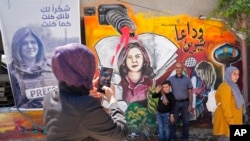The three-member U.N. Independent International Commission of Inquiry on the Occupied Palestinian Territory, including East Jerusalem, and Israel will begin public hearings on alleged human rights violations in the Palestinian territories in Geneva this week.
The commission chair, South African jurist and former U.N. high commissioner for human rights, Navi Pillay, will open the hearings Monday, to be followed by live testimony from three witnesses. The next hearings are expected to be held early next year, but not in Geneva.
The public hearings will focus on the closure orders and Israel's terrorism designation of several Palestinian nongovernmental organizations. It also will explore the events surrounding the West Bank killing of Palestinian American journalist Shireen Abu Akleh in May.
Abu Akleh allegedly was killed by Israeli sniper fire. An Israeli investigation into the killing concluded the journalist was most likely killed in “unintentional fire” from an Israeli soldier who did not know she was a journalist.
U.N. Human Rights Council spokesman Rolando Gomez said during a briefing with reporters that public hearings are being held to clarify these issues. He said both Israelis and Palestinians will testify.
“This current commission of inquiry is unique in that it is looking into human rights abuse and violations, alleged human rights abuse and violations in both the occupied Palestinian territory and in Israel. … And they are, of course, impartial, independent investigators. So, any allegations of bias are absolutely false. They are independent and impartial and will be looking at both sides,” he said.
The commission was established in 2021 by the U.N. Human Rights Council and appointed Pillay, as well as Indian human rights expert Miloon Kothari and Australian jurist Christopher Sidoti, as members.
Gomez said both Israeli and Palestinian witnesses have agreed to be identified and to testify publicly. He said, however, the Israeli government is not participating.
“The commission of inquiry has reached out to Israel for its comments and seeking cooperation and access. However, they have not responded. … Unfortunately, they have not received that cooperation or access into the occupied Palestinian territory. Palestine -- they have cooperated with the commissioners and have done so since the beginning of their mandate last year,” he said.
Gomez said information normally is collected from victims and witnesses privately. Public testimony, though, he said, mitigates speculation and misinformation regarding the work of the commission. "What you see is what you get,” he said.
The commission presented its first report to the U.N. Human Rights Council in June. The U.S. ambassador to the council, Michele Taylor, called the report a “further demonstration of long-standing, disproportionate attention given to Israel in the council and must stop.”
She said, “The Council should address all human rights concerns, regardless of country, in an even-handed manner.”
The commission reports to the Human Rights Council and General Assembly annually.






